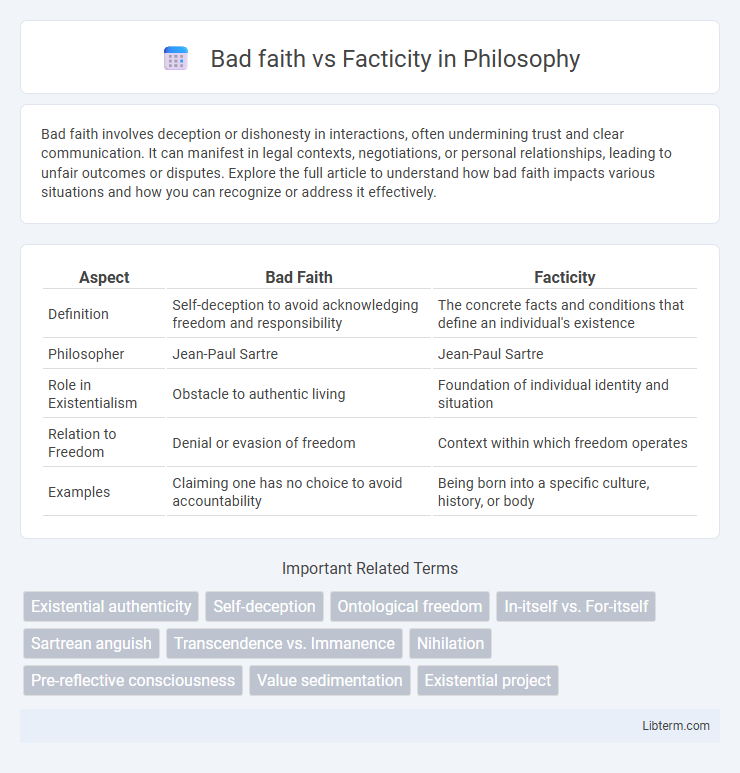Bad faith involves deception or dishonesty in interactions, often undermining trust and clear communication. It can manifest in legal contexts, negotiations, or personal relationships, leading to unfair outcomes or disputes. Explore the full article to understand how bad faith impacts various situations and how you can recognize or address it effectively.
Table of Comparison
| Aspect | Bad Faith | Facticity |
|---|---|---|
| Definition | Self-deception to avoid acknowledging freedom and responsibility | The concrete facts and conditions that define an individual's existence |
| Philosopher | Jean-Paul Sartre | Jean-Paul Sartre |
| Role in Existentialism | Obstacle to authentic living | Foundation of individual identity and situation |
| Relation to Freedom | Denial or evasion of freedom | Context within which freedom operates |
| Examples | Claiming one has no choice to avoid accountability | Being born into a specific culture, history, or body |
Understanding Bad Faith: Definition and Origins
Bad faith, or "mauvaise foi," is a concept central to existentialist philosophy, notably explored by Jean-Paul Sartre, referring to the act of self-deception where individuals deny their own freedom and responsibility. It originates from Sartre's work "Being and Nothingness," where bad faith is defined as a failure to acknowledge the authentic self by adopting false values or identities imposed by societal expectations. This phenomenon contrasts with facticity, which encompasses the concrete facts and conditions of existence that individuals must recognize without escaping into denial.
What is Facticity? Key Concepts Explained
Facticity refers to the concrete details and conditions of one's existence, such as birth, history, environment, and social context that are beyond individual control. It represents the objective realities that shape human experience and limit freedom, providing the factual groundwork upon which choices are made. In existential philosophy, facticity contrasts with bad faith, where bad faith occurs when individuals deny or escape these inherent conditions to deceive themselves about their freedom and responsibility.
Philosophical Foundations: Sartre and Existentialism
Sartre's concept of bad faith hinges on self-deception where individuals deny their own freedom and responsibility, contrasting sharply with facticity, the concrete details of one's existence that are unchangeable yet must be acknowledged. Existentialism asserts that despite facticity -- such as past events, social conditions, or bodily limitations -- individuals possess radical freedom to define themselves through choices, making it essential to confront rather than evade these given facts. The philosophical foundation lies in the tension between accepting facticity and rejecting bad faith to live authentically, embodying Sartre's assertion that existence precedes essence.
The Role of Authenticity in Bad Faith and Facticity
Authenticity plays a crucial role in distinguishing bad faith from facticity by highlighting the individual's acceptance of their inherent conditions and freedom to choose. Bad faith involves self-deception where one denies the factual limitations of their existence, refusing to acknowledge authentic responsibility for their actions. Embracing facticity with authenticity requires recognizing life's given circumstances while exercising genuine freedom to create meaning and define oneself.
Examples of Bad Faith in Everyday Life
Bad faith manifests in everyday life when individuals deceive themselves to avoid acknowledging uncomfortable truths, such as a smoker convincing themselves their habit isn't harmful despite medical evidence. Employees pretending satisfaction at a toxic workplace while internally resenting it exemplify bad faith through self-denial. Another common example is someone blaming external circumstances for their failures instead of accepting personal responsibility, illustrating facticity avoidance in their behavior.
Facticity: Accepting the Limits of Existence
Facticity refers to the undeniable conditions and constraints that define human existence, including birth, death, and past events that shape one's reality. Embracing facticity means acknowledging these limits without denial, grounding personal freedom in the concrete circumstances of life. This acceptance allows individuals to act authentically within the parameters of their situation, rather than fleeing from the inherent constraints of being.
Conflict: How Bad Faith Distorts Facticity
Bad faith distorts facticity by causing individuals to deny or misinterpret the concrete realities of their existence, leading to self-deception and a refusal to accept responsibility for their choices. This conflict arises when a person evades the limitations and conditions imposed by facticity, such as social roles, past actions, or inherent characteristics, thereby creating a false sense of freedom or identity. As a result, bad faith undermines authentic being by masking the tension between the factual circumstances and the individual's freedom to act within them.
Psychological Implications of Bad Faith vs Facticity
Bad faith, as defined by existentialist philosophy, involves self-deception and denial of one's freedom, leading to psychological distress, anxiety, and inauthentic existence. Facticity refers to the concrete conditions and limitations of one's situation, which, when acknowledged, enable authentic self-acceptance and psychological resilience. Understanding the tension between bad faith and facticity reveals the impact of self-deception versus acceptance on mental health and existential well-being.
Overcoming Bad Faith: Embracing Responsibility
Overcoming bad faith requires embracing responsibility by acknowledging one's freedom to make authentic choices despite external pressures or limitations. Facticity, the concrete conditions and facts of existence, provides the context in which individuals must act authentically, accepting their circumstances without self-deception. Embracing responsibility involves a conscious effort to reconcile facticity with freedom, thereby overcoming bad faith and fostering genuine selfhood.
Bad Faith vs Facticity: Practical Applications and Insights
Bad faith and facticity are critical concepts in existential philosophy, particularly in the works of Jean-Paul Sartre, where bad faith involves self-deception to avoid acknowledging one's freedom and responsibility, while facticity refers to the concrete realities and conditions of one's existence. In practical applications, recognizing bad faith helps individuals confront their authentic choices despite limiting circumstances imposed by facticity, fostering personal growth and genuine decision-making. Understanding the dynamic between bad faith and facticity provides insights into overcoming denial and embracing the tension between freedom and constraint in everyday life.
Bad faith Infographic

 libterm.com
libterm.com